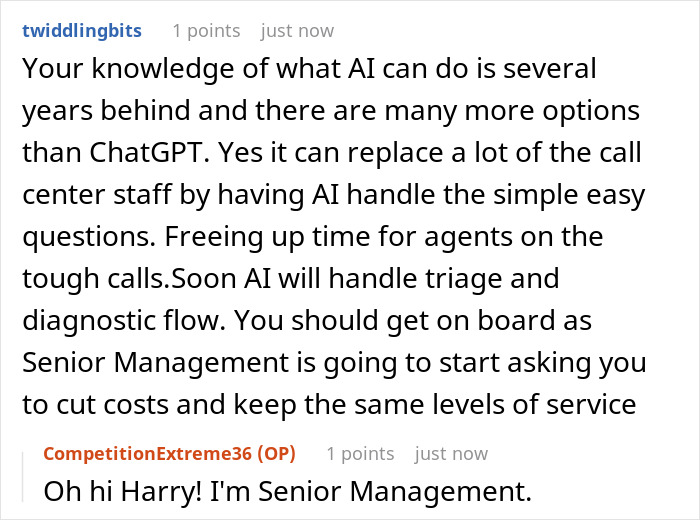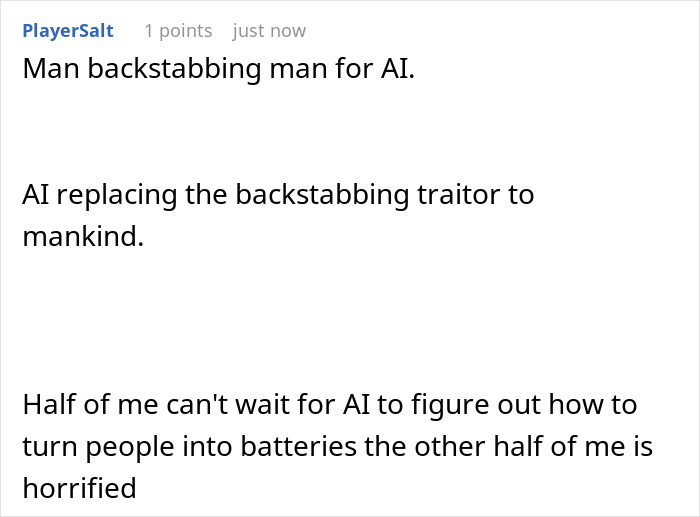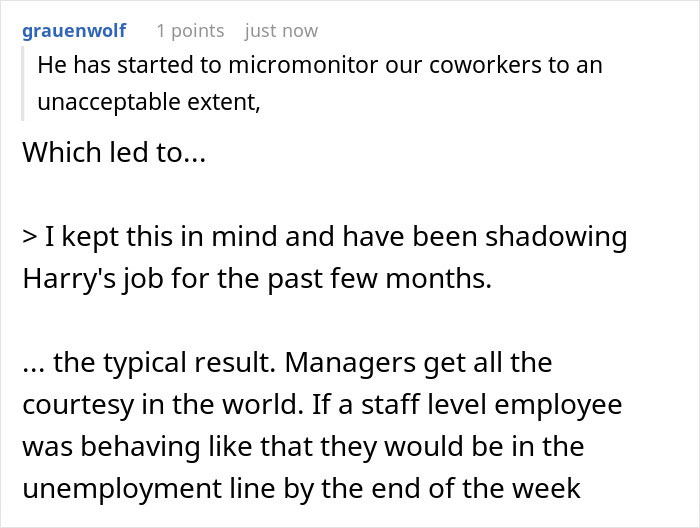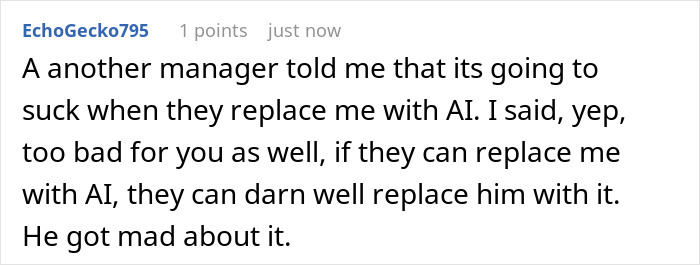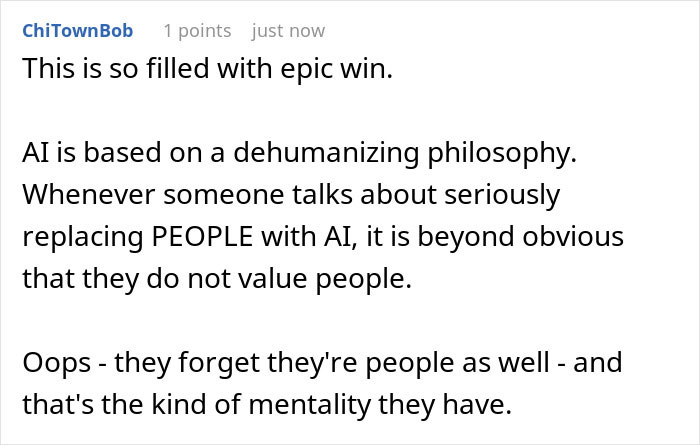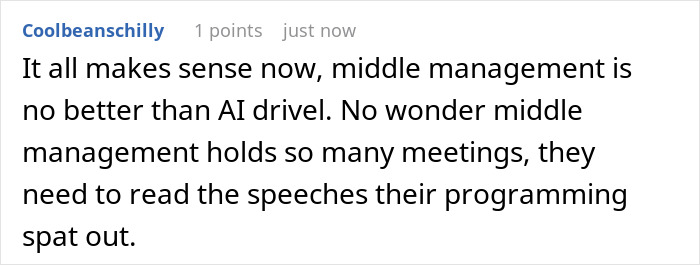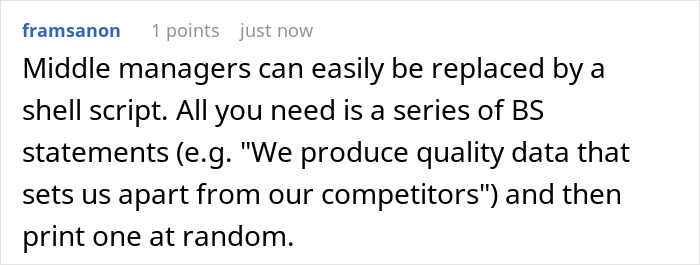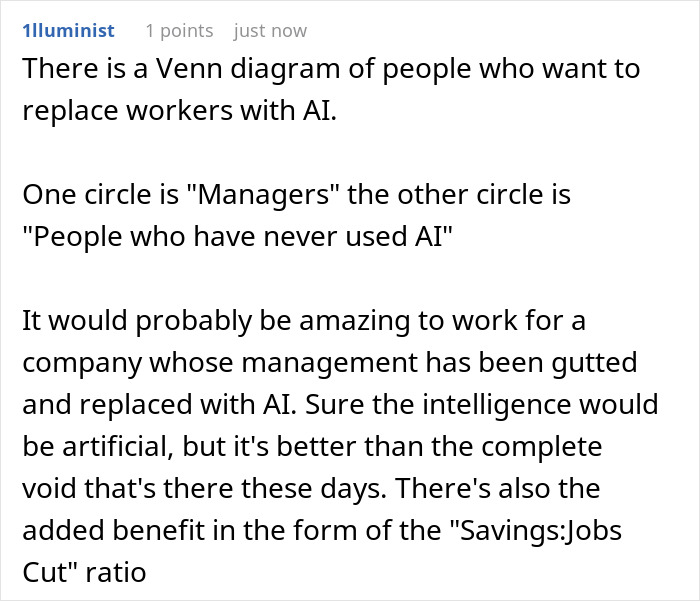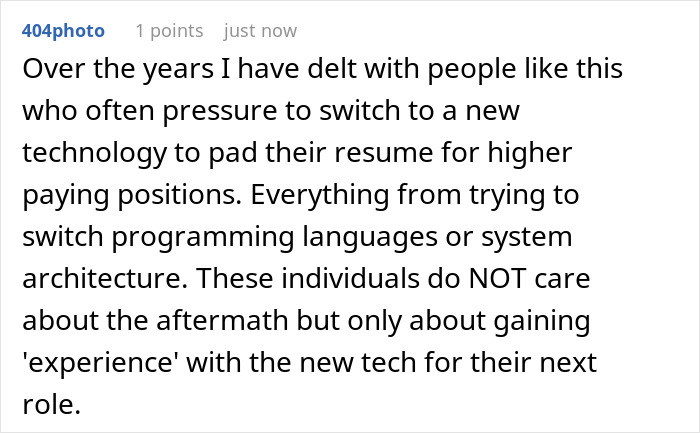With the spread of artificial intelligence tools, many companies are looking to increase efficiency and cut costs. However, some techno-optimists are getting a tad too… overzealous. They think that AI is the perfect solution to every problem. When in reality, these tools are currently limited and little to no match to competent, experienced employees. Especially in niche roles.
Redditor u/CompetitionExtreme36, a business owner, went viral after sharing how his new middle manager wanted to replace some employees with AI. However, the situation took an unexpectedly poetic twist. Scroll down for the full story, as well as to read the reactions shared by the members of the popular r/MaliciousCompliance online group.
Bored Panda reached out to the author, u/CompetitionExtreme36, and he was kind enough to share his thoughts on good workplace management, as well as the future impact of AI on work. You’ll find our interview with him below.
Many employees are worried that they’ll get replaced by AI for the sake of efficiency and cost-cutting
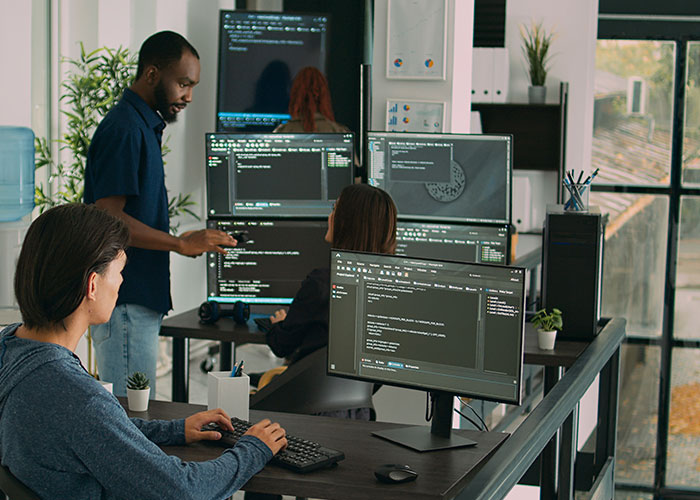
However, some bosses have their backs. One business owner shared how he put a stop to a manager’s plans to replace employees with AI
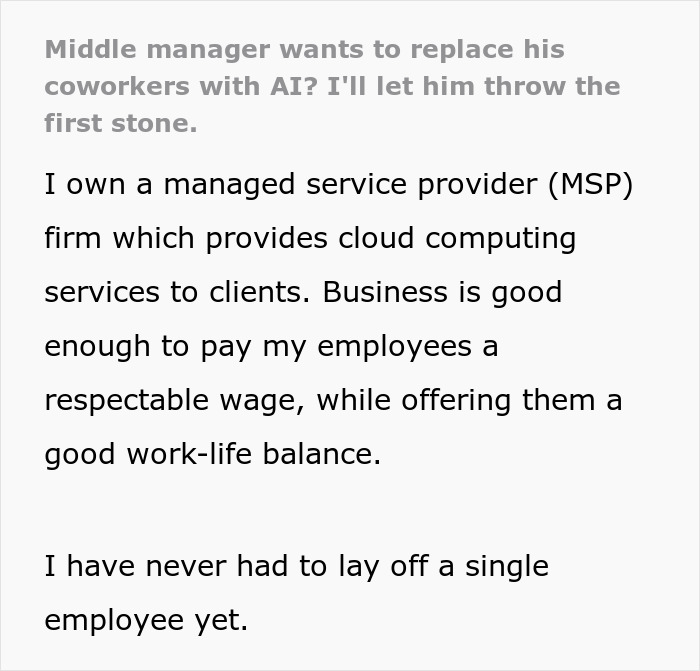
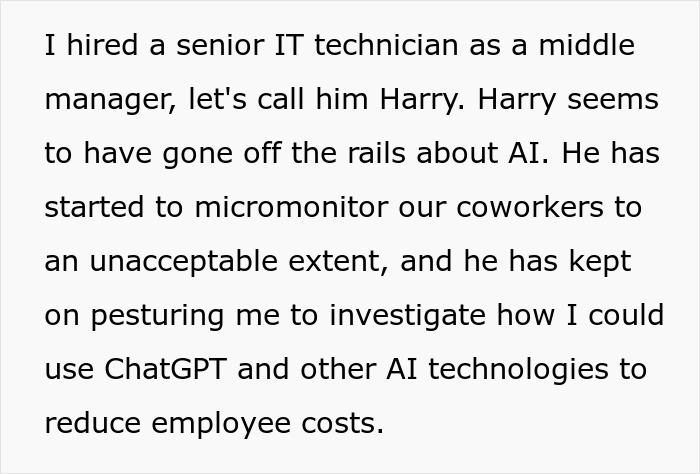
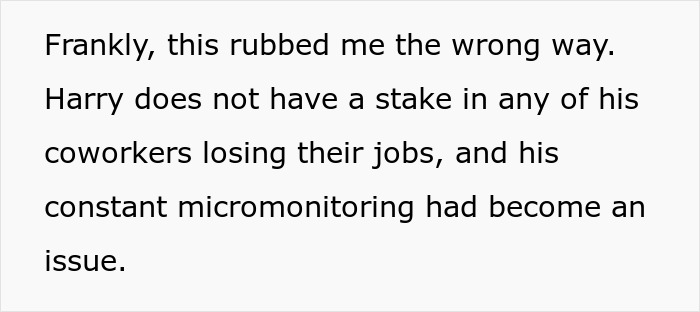
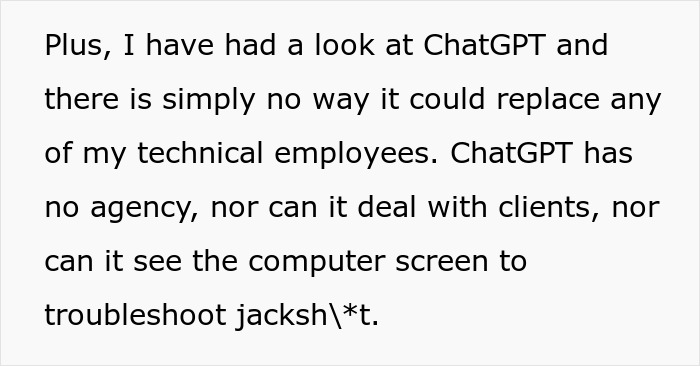

Image credits: DC_Studio / envatoelements (not the actual photo)
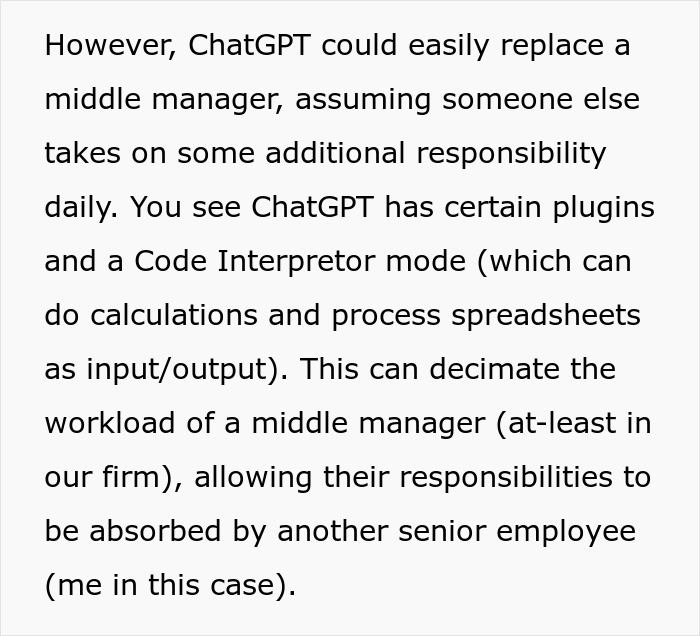
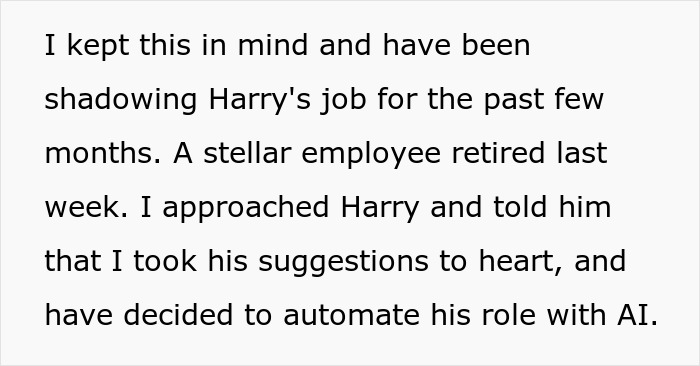

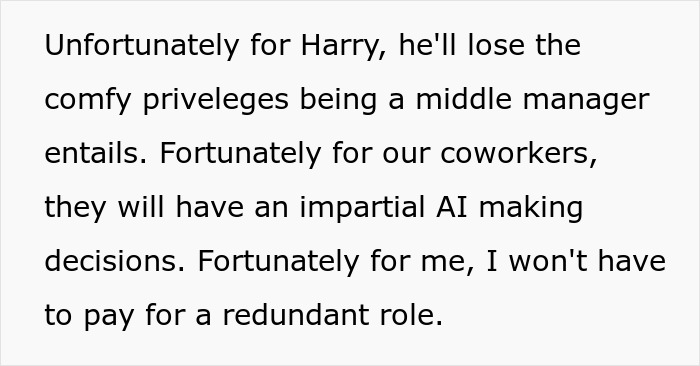
Image credits: CompetitionExtreme36
Good managers understand the need for trust and delegation

Image credits: Yan Krukau / pexels (not the actual photo)
We asked u/CompetitionExtreme36 for his thoughts on what lies at the core of being a truly good manager. According to him, it’s a blend of different factors.
“In my honest opinion, a good manager should maintain good workplace morale, along with good metrics, with the least involvement possible,” he said.
The OP added that the only exception to (some minor) micromanagement might be made when dealing with external clients.
Bored Panda was curious to get the author’s take on the future relationship between work and AI. “I hope AI ushers in a world with better medical treatments and scientific advancements, but the economic implications need to be dealt with,” he said.
“I think a bareboned UBI [universal basic income] would be needed immensely,” u/CompetitionExtreme36 suggested.
From his perspective, some decisions that could “mitigate labor oversupply due to AI” might include retraining existing employees, having less intense work weeks, or having just one person per family unit work.
“I still think AI development should go ahead full speed, simply because of the possibility of much-needed scientific advancement,” he told us.
Micromanagers tend to reduce motivation in the team

Image credits: Yan Krukau / pexels (not the actual photo)
As the author mentioned, the new middle manager was a huge micromanager. This is utterly awful for practically any workplace environment: you’re only adding tension, spreading mistrust, and demotivating the staff if you’re watching their every footstep.
Micromanagers are hardly ever satisfied with their colleagues’ results. They get mad when somebody completes a task differently than they would. They always want to be updated on what everyone’s doing at all times. And they absolutely love to criticize their colleagues’ work. In short, they can’t see the forest for the trees: they hone in on the details, ignoring the bigger picture.
CNN reports that the use of AI will reduce the number of workers at ‘thousands’ of companies around the world over the next 5 years. According to a global survey of 2,000 executives, conducted by Adecco Group and Oxford Economics, 41% of respondents expect to employ fewer people because of AI.
Look, let’s not beat around the bush. Some jobs are likely going to be replaced by AI, sure. But the more likely scenario is that AI tools are going to become so ubiquitous as they’re integrated everywhere and anywhere that we’ll be working alongside artificial intelligence.
It’ll be a future of collaborative work, where our own skills are enhanced by high-level programs and AI assistants. But until then, we are going to see massive shifts in the job industry.
Some professions are far safer from becoming obsolete than others

Image credits: Mikhail Nilov / pexels (not the actual photo)
There will always be some managers and business owners who just focus on the upsides of using AI (e.g., smaller teams, lower overhead costs, fewer salaries to pay, and greater speed) while ignoring the downsides (e.g., AI ‘hallucinations,’ ‘soulless’ content, the lack of empathy, etc.).
As we’ve previously covered on Bored Panda, roles that require a lot of creativity, critical thinking, and emotional intelligence are less likely to become automated. So, people like artists, therapists, and strategic decision-makers are safer than others.
Workers like scientists and emergency responders, who have to deal with complex problem-solving in highly unpredictable environments, are also going to be very hard to replace fully.
Meanwhile, jobs that require a ton of empathy and human interaction are also safe(r) from AI. So, nurses, educators, and social workers can breathe a sigh of relief… for now. Unless something drastically changes in the development of AI tech, there will always be a demand for genuine humanity, creativity, and flexibility.
Let’s also not forget that until Nvidia and other companies come out with better robot workers, tradespeople are also going to be in demand. If your job requires lots of adaptability and manual dexterity, you don’t have to worry much about the immediate future. Your skills are going to continue to be in high demand.
Meanwhile, some roles that are more vulnerable to becoming obsolete include data entry, data analysis, telemarketing, cashiering, and technical writing. Anyone currently working with these things ought to be as flexible and adaptable as they can to stay relevant in the job market.
Adapting to this new reality means focusing on hard skills (like programming and machine learning so you’re not left behind) and soft skills (like the aforementioned emotional intelligence, creativity, etc.).
You should also focus on building your professional network so you have access to more job opportunities if you want to upskill or if you’d like to change your professional focus altogether. At the end of the idea, all of this comes down to you building a ‘brand’ for yourself as a working professional. What are your skills? What are your values? What do you stand for, and what do you bring to the table?
The story went viral, and many readers wanted to share their thoughts on what happened
